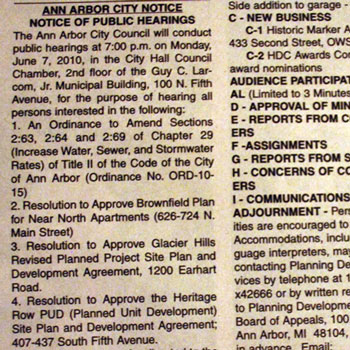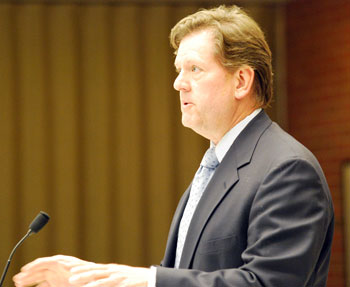Collected wave and greeting from Ward 5 city council candidate Carsten Hohnke, headed south on Eberwhite’s west side – appears to be squeezing in some canvassing hours before the rain begins. Mayorally speaking, that stretch along Eberwhite has Hieftje signs outnumbering Lesko signs by 9 to 2 at last count.
Archive for June, 2010
A2: Food
The Four Obsessions blog provides a menu plan for the wealth of greens received from a Tantre Farm share. A sampling: “Tonight I’ll be using the turnip greens and a couple of garlic scapes to make this Turnip Green Tart and some of the green frilly lettuce, radishes and scallions will be assembled into a salad. I’ll use the other garlic scapes (and add in the radish tops) to this garlic scape spaghetti carbonara. I like that it uses whole wheat pasta and I have some good eggs from the farmer’s market too. Braised turnips will make a good side.” [Source]
Farmers Market
Michigan Ballroom Dance Team fundraising for National Wildlife Federation. [photo]
A2: Business
The Detroit News reports on how Ann Arbor-based Domino’s Pizza has capitalized on its new pizza and massive marketing campaign to boost sales by 14.3% during the first quarter of 2010, a far greater increase than its competition. Profits rose 3.2%, to $24.5 million. [Source]
Column: Arbor Vinous
Don’t point the finger of blame at Hieftje, Lesko or even RichRod for this one. In-the-know locals assign responsibility where it clearly belongs.
It’s all White Zinfandel’s fault.
Last week, San Francisco Chronicle wine columnist Jon Bonné penned a sentence I wish I’d written to describe a peculiar phenomenon: “The more people drink rosé, the more mediocre rosé appears.”
During the 1980s, the national craze for mediocre-by-design White Zin so came to define rosé that no “serious” wine drinker wanted to be seen sipping something pink from a glass.
It’s taken the market for high-quality rosé nearly a full generation to recover from the hangover. [Full Story]
Heritage Row Vote Likely Delayed
On the published agenda for Monday’s June 7 council meeting are public hearings on two different site plans – Heritage Row and a planned project at Glacier Hills. Public hearings such as these are required to be published in a newspaper of general circulation one week before they take place.

From the June 3, 2010 edition of the Washtenaw Legal News, the published notice of the June 7, 2010 Glacier Hills and Heritage Row site plan public hearings. (Image links to wider view and higher resolution file.)
In a phone interview on Friday, city clerk Jackie Beaudry confirmed for The Chronicle that an email sent by the Ann Arbor city clerk’s office to the Detroit News – requesting publication of the notices for Sunday, May 30 – was not received by The News. Due to the Memorial Day holiday, the city clerk’s staff did not learn of the communication snafu until Tuesday. That was not in time to meet the publication requirement for the June 7 public hearings.
As a result, no vote is now expected on the site plans for those two projects at Monday’s June 7 city council meeting. The notice of public hearings for those projects, Beaudry said, was published in the June 3 edition of the Washtenaw Legal News. Those WLN notices in the June 3 edition still specify the site plan public hearings for June 7, but indications from inside city hall are that if when the hearings are opened on June 7, they’ll be left open and continued through the council’s June 21 meeting, when a vote will be taken on the site plans as well as the Heritage Row rezoning.
The zoning change for the Heritage Row project, which is considered separately from the site plan by the council and is given a separate public hearing, was properly noticed, Beaudry told The Chronicle. How can one of the public hearings receive proper notice, but the other one not, when they’re part of the same project? [Full Story]
Liberty & State
A scruffy young couple sitting on the ground outside Borders. Their sign says: “Really Bad Advice $1″
Schools: Achievement Gap or Equity Gap?
On May 27 at Mitchell Elementary School, 30 people gathered in a room. The group included a school psychologist, four school board members, a social worker, four school principals, four teachers, a pastor, the president of the local chapter of the American Civil Liberties Union, an education researcher, and representatives of local community-based organizations.

Simone Lightfoot, left, and Susan Baskett at the Beyond the Talk meeting at Mitchell Elementary School on Thursday, May 27. (Photos by the writer.)
Sponsored by Ann Arbor Public Schools board trustees Simone Lightfoot and Susan Baskett, the meeting was a follow-up to an event held in late April at the Peace Neighborhood Center. At that event, the College and Career-Ready (CCR) Review, AAPS superintendent Todd Roberts and his senior instructional staff had presented a subset of data on student achievement in the district, broken down by race.
The breakdown showed an ongoing difference in test scores between whites and other races. The focus of the May 27 Mitchell meeting, called Beyond the Talk, was on brainstorming around what co-facilitators Lightfoot and Baskett called the elements of a plan to address this issue.
Since April’s CCR Review, the community has seen the Lunch Bunch program at Dicken Elementary School – an initiative intended to address this gap – ended when it was found by the district to violate relevant anti-discrimination laws. The story of parents’ complaints about a Lunch Bunch field trip, which was restricted to black students only, had inflamed controversy that gained national attention.
Depending on your perspective, the Beyond the Talk meeting looked either poorly-attended or well-attended. Early in the evening, one participant commented that African Americans were poorly represented at the meeting, and contended that any efforts to close the gap, however the gap was defined, would be unsuccessful as long as the “apathy” continued.
But Lightfoot declared that work gets done by those who show up to do it. And so they dove into their work.
“Current programs are maintaining the gap, not closing it.” “It’s not the kids – it’s the system.” “The system is not broken. It’s working exactly how it was designed to work.” “People are scared to shake up the status quo. It’s like fighting a war on many, many different fronts.”
Thoughts like these were distilled into bullet points by the end of the meeting, as participants discussed what next steps should be taken to address what has commonly been called the “achievement gap.” [Full Story]
Liberty & Fifth
Reader report of foul smell from construction-related sewer main break cannot be verified. Road by any other main would smell as street. [photo]
Liberty & Fifth
Open for business signs on construction barriers for Herb David and Jerusalem Garden consistent with past practice and lawsuit settlement agreement. [photo]
UM: Environment & Politics
The New York Times reports on how upcoming elections and political turnover in several Great Lakes states – including Michigan – could affect initiatives aimed at curbing greenhouse gases. The article quotes Barry Rabe, a UM public policy professor: “These governors are almost all Democratic incumbents in a year that is thought to not be good for incumbents or Democrats.” [Source]
Column: Better than Perfect
I’d just finished writing my commentary Wednesday night, when a friend tipped me off that I should be watching the Tigers game. He didn’t say why, because there’s a code in baseball against jinxing a pitcher who’s throwing a great game. I turned on the TV, and saw the Tigers were beating Cleveland, 1-0, in the eighth inning. Then I finally realized Detroit pitcher Armando Galarraga wasn’t just working on a no-hitter, but a perfect game.
What’s the difference? A no-hitter means just that: A pitcher can’t give up any hits. But he can still let a runner get to first base on a walk or an error, and keep his no-hitter. But to throw a perfect game, the pitcher can’t let a single batter reach first base for any reason. He’s got to get 27 straight outs.
How rare is that? In the 135-year history of Major League Baseball, only twenty pitchers have done it. Twenty. It’s ten times rarer than a no-hitter – so rare, in over a century of Tiger baseball, not one pitcher had ever thrown a perfect game. Ever.
But there he was, Armando Galarraga from Venezuela, pitching a perfect game. [Full Story]
S. University & E. University
2:30 a.m. Girl beating up guy.
Planning Commission: A Matter of Timing
Ann Arbor City Planning Commission (June 1, 2010): City planning commissioner Evan Pratt’s garden doesn’t have any deadlines attached to the work he does in it. So there might not be any corn this year, he says.

Mike Rein of Bowers + Rein spoke to the Ann Arbor city planning commission in opposition to eliminating time deadlines for planning commission and city council review of site plan submissions. (Photos by the writer.)
He was illustrating why he thought deadlines in the approval process for site plans and other petitions were a good idea.
But Pratt was the lone dissenter on the commission, which recommended that deadlines in the city’s zoning code be replaced with a standard of “reasonable time.”
The current deadlines apply to two different stages of site plan reviews. The first is the maximum time between the planning commission’s receipt of a report from city staff and the commission’s recommendation – 60 days. The second stage is the time between the planning commission’s recommendation and city council action – 30 days. The commission voted to recommend replacement of the deadlines with language that refers to a “reasonable” time.
Currently, if the bodies do not act within the prescribed time parameters, site plan petitions are considered to be recommended or approved automatically – by default. At its Tuesday meeting, the automatic approval language was recommended to be dropped from the city code.
The code changes regarding timing would now need city council approval in order to take effect.
The timing issue joins two other technical revisions to the city’s zoning code, which the planning commission voted to recommend at its previous meeting. Those revisions involve fee reimbursements associated with applications and a requirement that up-to-date drawings for site plans be publicly accessible 24/7 for a week prior to public hearings.
At Tuesday’s meeting, the commission also heard a presentation from the city’s environmental coordinator, Matt Naud, on the city’s environmental indicators. Part of the background of the presentation was a recent joint meeting of the city’s planning, energy and environmental commissions that focused on sustainability. [Full Story]
Mulholland
Owner says 343 Mulholland now on the market. To the Reinhart listing it’s worth adding that the house is located at the higher altitudes of the “Upper Mulholland” end of the street. Also, walking distance to teeter totter.
A2: Ann Arbor News Building
In an email to members, the University of Michigan Credit Union announced that it has agreed to purchase the former Ann Arbor News building at the southwest corner of Huron and Division streets. [.txt of email] Previous Chronicle reporting: “Credit Union Eyes Former News Building”
Liberty & Division
The Macpodz are rocking Liberty Plaza for Sonic Lunch – a block away at Le Dog, there’s a long line of people, some of them getting the SL special. [photo]
Park Road
New addition to the Huron Valley Swim Club: Designer/developer Alan Good of Henge concrete ping pong tables, showing how it works at the first Ann Arbor installation of one of his tables, made in Michigan. [photo]
A2: Downtown Safety
The Main Street Area Association has asked members to complete an online survey on perceptions of downtown safety, conducted by the Ann Arbor Downtown Development Authority. The survey is estimated to take five minutes to complete – and you don’t have to be an MSAA member to take it. [Survey]
Liberty & Maynard
A busted, leaky skylight in the atrium of the McKinley building. Staff at the FedEx store there say it’s likely caused by people throwing things down at it – beer bottles, etc. – from the parking structure next door.
WCC President Repays $4,000 Dinner Tab
Washtenaw Community College President Larry Whitworth says he is taking full responsibility for $4,000 spent by the college on a dinner for its board of trustees annual retreat in early March. At a press briefing earlier today at his office on the WCC campus, Whitworth said he planned the retreat and therefore he – not the WCC board members – should take the blame for the expense. It has become an issue in trustee David Rutledge’s bid for the 54th District state House seat.
As first reported by The Chronicle, the board of trustees two-day retreat at the Westin Book Cadillac hotel in Detroit cost a total of $9,910.70, including dinner at the hotel’s 24grille restaurant and $5,887.43 in hotel charges. WCC’s paper The Washtenaw Voice later reported that the dinner bill included $573 worth of wine.
Whitworth said the cost of the meal was higher than anticipated due to the fact that he missed a detail on the menu that 24grille faxed him before the retreat. Specifically, he didn’t read the fine print stating that the restaurant would charge $100 per person for the meal, not including tax and gratuity. Whitworth said he expected to pay about $2,000 and was shocked when he saw the bill. [Full Story]
UM: Al & Tipper Gore
In the Washington Post, Ellen McCarthy takes a look at why the news of Al and Tipper Gore’s divorce has sent so many people into a tailspin. The piece quotes Terri Orbuch, a marriage therapist and UM sociology professor: “They were seen as this perfect couple, that’s why we’re traumatized.” [Source]
WCC President’s Office
UM: Dave Brandon
In Fast Company magazine column on leadership, John Baldoni looks at how Dave Brandon – UM’s new athletic director – has managed the university’s response to an NCAA investigation into the football program’s rules violations: “The biggest problem facing the football program is really not the NCAA violations; it is the rift over [coach Rich] Rodriguez. Since Rodriguez has won only eight games in two years, losing twice to arch-rival Ohio State and missing the bowl season for the past two years, many fans dislike him. Yet Rodriguez’s players, and many students, support him. How Brandon has dealt with the controversy is a lesson in leadership.” [Source]
A2: BP Oil Spill
Writing on his One Step Closer blog, Ken Wilson – senior paster of Vineyard Church of Ann Arbor – reflects on the BP oil spill and what lessons we might learn from it: “As the engineers seek to contain the gusher in the Gulf of Mexico, how do we get our hearts around what’s happening there? An ancient take on the world around us might help. Few people seem to notice that in the creation account of Genesis, chapter one, God blessed the sea creatures and the birds of the air – the very creatures affected by the British Petroleum oil spill – first.” [Source]
Community, Not Pioneer
In a report on a recent school board meeting, we identified David Shapiro and Sarah Juster as Pioneer High School students. They graduated from Community High School. We acknowledge the error here and have corrected the original article.
21st Monthly Milestone
Editor’s Note: The monthly milestone column, which appears on the second day of each month – the anniversary of The Ann Arbor Chronicle’s launch – is an opportunity for either the publisher or the editor of The Chronicle to touch base with readers on topics related to this publication.
In this month’s milestone message, I’m going to explain what we do here at The Ann Arbor Chronicle. And I’m going to do it in a way that is intended to inspire additional voluntary subscriptions to our publication.
About 47 years ago, in a speech delivered in London to correspondents for Newsweek magazine, Washington Post publisher Philip Graham called journalism the “first rough draft of history.” The contention that journalists are writing history – even just a first rough draft – is pretty high-minded talk. Writing any draft of history certainly sounds sexier than the sheer drudgery of taking notes through a six-hour city council meeting seated on hard pew-like benches and condensing that material into a few thousand words for Ann Arbor Chronicle readers.
That’s an aspect of the job Graham meant in the first, less famous part of the “rough draft” quote [emphasis added]: “So let us today drudge on about our inescapably impossible task of providing every week a first rough draft of history that will never really be completed about a world we can never really understand …”
I think that digital technology allows journalists the possibility of providing a far better first draft of history than was previously possible. It’s better in the sense that it can be more comprehensive, and more detailed than the drafts that were constrained by printed newspaper column inches.
But seriously. Why does Ann Arbor need someone to write down its history? Do we here at The Chronicle really imagine that 100 years from now anyone will care that some new parking meters got installed in front of the Old Town Tavern? Nope. I don’t. Not really. Well, maybe. Okay, no. Not, really.
Sure, in an unguarded moment, I’ll indulge in the reverie that Ann Arbor’s 2110 version of Laura Bien will be mining The Chronicle archives and writing – for some next-century information distribution system – an article called “The Man Who Loved Parking Meters.”
More useful than 100-year-old history, however, is the history of five years ago, a year ago, or even a month ago. Because it’s the things that were said and done one month ago or one year ago that matter for elected officials making policy decisions, and for voters making choices at the polls.
So this month’s milestone provides a couple of examples demonstrating that The Chronicle is a pretty decent source of recent local history – a better source than the recollections and conversations of our local political leaders. [Full Story]
Infrastructure Outlook: “Train Wreck”
With revenues declining on several fronts and investments cut as a result, the infrastructure of southeast Michigan – its transit, water and sewer systems – is facing a “train wreck,” Washtenaw County commissioners were told at a recent working session.
A report from the Southeast Michigan Council of Governments, drafted by a task force on infrastructure led by county board chair Rolland Sizemore Jr., laid out steps that SEMCOG hopes to take to address the situation – including, most immediately, lobbying Lansing lawmakers to raise the state’s gas tax, which funds road construction and upkeep. The briefing prompted commissioner Jeff Irwin to express frustration at SEMCOG’s approach, which he indicated wasn’t bold enough to tackle the underlying problems that have fostered sprawl.
At their May 20 session, commissioners also got an update on what’s known as the Chevron project – a multi-year, multimillion-dollar effort to cut energy usage in county facilities. And staff of the county’s energy and economic development office asked for feedback from commissioners about what type of pilot project the county should pursue, as part of a recent federal energy grant. Some commissioners are leaning toward a solar photovoltaic installation.
The meeting also included a presentation by county administrator Verna McDaniel on a request for more funds to complete the county jail expansion and new 14A-1 District Court facility. The Chronicle covered that topic in a previous report. [Full Story]
Downtown Library
The redbuds are gone. I wonder if a good home was found for them.
Cobblestone Farm
Four little piggies rooting in the mud. Goats, chickens, geese and ponies look spotless by comparison, but don’t seem to be having as much fun.






